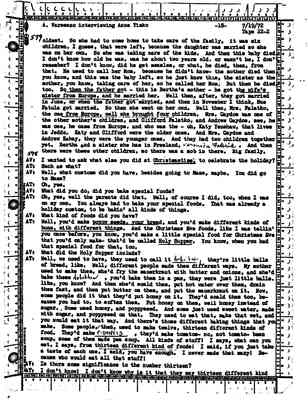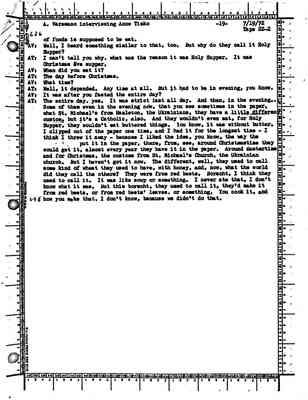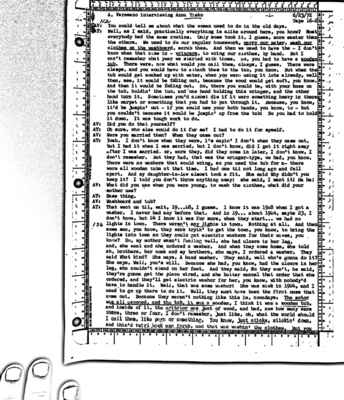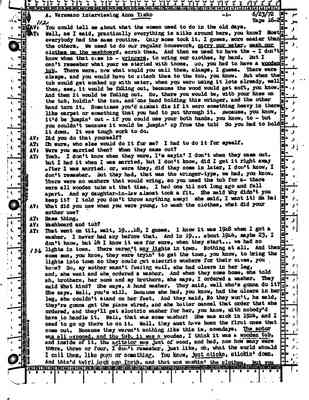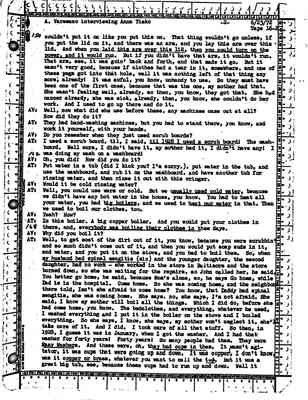Pages
53
A. Varesano interviewing Anne Timko -18- 7/19/72 Tape 22-2
oldest. So she had to come home to take care of the family, it was six children, I guess, that were left, because the daughter was married so she was on her own. So she was taking care of the kids. And then this baby died. I don't know how old he was, was he about two years old, or wasn't he, I don't remember? I don't know, did he get measles, or what, he died, then, from that. He used to call her Mom, because he didn't know - the mother died then you know, and this was the baby left, so he just knew this, the sister as the mother, you know, taking care of her, so he called her Mom. But then he died too. So then the father got - this is Bertha's mother - he got the wife's sister from Europe, and he married her. Well then, after, they got married in June, or when the father got married, and then in November I think, Sue Fatula got married. So then she went to her own. Well then, Mrs. Falatko, the one from Europe, well she brought four children. Mrs. Gaydos was one of the other mother's children, and Clifford Falatko, and Andrew Gaydos, see, he was one, he came from Europe, and who was the - oh, Katy Yenshaw, that lives in Jeddo. Katy and Clifford were the older ones. And Mrs. Gaydos and Andrew Zahay, they were the younger ones. And they had two children together yet. Bertha and a sister she has in Freeland, Veronica Falerik. And then there were these other children, so there was a mob in there. Big family. AV: I wanted to ask what else you did at Christmastime, to celebrate the holiday? AT: Such as what? AV: Well, what customs did you have, besides going to Mass, maybe. You did go to Mass? AT: Oh, yes. AV: What did you do, did you bake special foods? AT: Oh, yes, well the parents did that. Well, of course I did, too, when I was on my own. You always had to bake your special foods. That was already a holiday custom, to be bakin' all kinds of things. AV: What kids of foods did you have? AT: Well, you'd make poppy seeds, your bread, and you'd make different kinds of buns, with different things. And the Christmas Eve foods, like I was tellin' you once before, you know, you'd make a special food for Christmas Eve that you'd only make - that'd be called Holy Supper. You know, when you had that special food for that, too. AV: What did the Holy Supper include? AT: Well, we used to have, they used to call it boleskis (?), they're little balls of bread, like. Well, different people made them different ways. My mother used to make them, she'd fry the sauerkraut with butter and onions, and she'd bake these boleskis (?), you'd bake them in a pan, they were just little balls, like, you know? And then she'd scald them, put hot water over them, drain them fast, and then put butter on them, and put the sauerkraut on it. Now, some people do it that they'd put honey on it. They'd scald them too, because you had to, to soften them. Put honey on them, well honey instead of sugar. Some used honey, and poppyseed. And some just used sweet water, made with sugar, and poppyseed on that. They used to eat that, make that wet, and you would eat it that way. And there's those different baking things that you make. Some people, then, used to make twelve, thirteen different kinds of food. They'd make pirogies, they'd make tomatos - no, not tomato - bean soup, some of them made pea soup. All kinds of stuff! I says, if you just take a taste of each one, I said, you have enough. I never made that many! Because who would eat all that stuff! AV: Is there some significance to the number thirteen? AT: I don't know! I don't know why is it that they say thirteen different kind
54
A. Varesano interviewing Anne Timko -19- 7/19/72 Tape 22-2
of foods is supposed to be eat. AV: Well, I heard something similar to that, too. But why do they call it Holy Supper? AT: I can't tell you why, what was the reason it was Holy Supper. It was Christmas Eve supper. AV: When did you eat it? AT: The day before Christmas. AV: What time? AT: Well, it depended. Any time at all. But it had to be in evening, you know. AV: It was after you fasted the entire day? AT: The entire day, yes. It was strict fast all day. And then, in the evening...Some of them even in the evening now, that you see sometimes in the paper, what St. Michael's from Hazleton, the Ukrainians, they have a little different custom, but its a Catholic, also. And they wouldn't even eat, for Holy Supper, they wouldn't eat buttered things. You know, if was without butter. I clipped out of the paper one time, and I had it for the longest time - I think I threw it away - because I liked the idea, you know, the way the put it in the paper, there, from, see, around Christmastime they would get it, almost every year they have it in the paper. Around Eastertime and for Christmas, the custom from St. Michael's Church, the Ukrainian church. But I haven't got it now. The different, well, they used to call some kind of wheat they uesd to have, with honey, and, now, what the world did the call the others? They were from red beets. Borscht, I think they used to call it. It was like soup or something. I never ate that, I don't know what it was. But this borscht, they used to call it, they'd make it from red beets, or from red beets' leaves, or something. You cook it, and how you make that, I don't know, because we didn't do that.
55
A. Varesano interviewing Anna Timko -1- 6/23/72 Tape 16-2
AV: You could tell me about what the women used to do in the old days. AT: Well, as I said, practically everything is alike around here, you know? Most everybody had the same routine. Only some took it, I guess, more easier than the others. We used to do our regular housework, carry our water, wash our clothes on the washboard, scrub them. And then we used to have the - I don't know when that came in - wringers, to wring our clothes, by hand. But I can't remembe what year we started with those. So, you had to have a wooden tub. There were, not what would you call them, clasps, I guess. There were clasps, and you would have to attach them to the tub, you know. But when the tub would get soaked up with water, when you were using it lots already, well then, see, it would be falling out, because the wood would get soft, you know. And then it would be falling out. So, there you would be, with your knee on the tub, holdin' the tub, and one hand holding this wringer, and the other hand turn it. Sometimes you'd almost die if it were something heavy in there like carpet or something that you had to put through it. Because, you know, it's be jumpin' out - if you could use your both hands, you know, to - but you couldn't because it would be jumpin' up from the tub! So you had to hold it down. It was tough work to do. AV: Did you do that yourself? AT: Oh sure, who elese would do it for me? I had to do it for myself. AV: Were you married then? WHen they came out? AT: Yeah. I don't know when they were, I'm sayin' I don't when they came out, but I had it when I was married, but I don't know, did I get it right away after I was married, or, wore they, did they come in later, I don't know, I don't remember. But they had, that was the wringer-type, we had, you know. There were no washers that would wring, so you need the tub for a - there were all wooden tubs at that time. I had one til not long ago and fell apart. And my daughter-in-law almost took a fit. She said Why didn't you keep it? I told ou don't throw anything away! she said, I want it! Ha ha! AV: What did you use when you were young, to wash the clothes, what did your mother use? AT: Same thing. AV: Washboard and tub? AT: That went on til, wait, 19...28, I guess. I know it was 1928 when I got a washer. I never had any before that. And in 19...about 1924, maybe 23, I didn't know, but 24 I know it was for sure, when they start...we had no lights in town. There weren't any lights in town. Nothing at all. And then some men, you know, they were tryin' to get the town, you know, to bring the lights into town so they could get electric washers for their wives, ou know? So, my mother wasn't feeling well, she had ulcers in her leg, and, she went and she ordered a washer. And when they came home, she told ah, brothers, her sons and my brothers, she says, I ordered a washer. They said What kind? She says, A hand washer. The said, well who's gonna do it? She says, Well, you's will. Because she had, you know, had the ulcers in her leg, she couldn't stand on her feet. And they said, No they won't, he said, they're gonna get the place wired, and she better cancel that order that she ordered, and they'll get electric washer for her, you know, with nobody'd have to handle it. Well, that was some washer! She was sick in 1924, and I used to go up there to do it. Well, they must have been the first ones that came out. Because they weren't nothing like this is, nowadays. The motor was all exposed, and the tub, it was a wooden, I think it was a wooden tub, and inside of it, the agitator was just of wood, and had, now how many were there, three or four, I don't remember, just like, oh, what the world should I call them, like pegs or something. You know, just sticks, stickin' down. And this'd twirl back and forth, and that was washin' the clothes, but you
56
A. Varesano interviewing Anna Timko -1- 6/23/72 Tape 16-2
AV: You could tell me about what the women used to do in the old days. AT: Well, as I said, practically everything is alike around here, you know? Most everybody had the same routine. Only some took it, I guess, more easier than the others. We used to do our regular housework, carry our water, wash our clothes on the washboard, scrub them. And then we used to have the - I don't know when that came in - wringers, to wring our clothes, by hand. But I can't remember what year we started with those. So, you had to have a wooden tub. There were, now what would you call them, clasps, I guess. There were clasps, and you would have to attach them to the tub, you know. But when the tub would get soaked up with water, when you were using it lots already, well then, see, it would be falling out, because the wood would get sofrt, you know. And then it would be falling out. So, there you would be, with your knee on the tub, holdin' the tub, and one hand holding the wringer, and the other hand turn it. Sometimes you'd almost die if it were something heavy in there like carpet or something that you had to put through it. Because, you know, it'd be jumpin' out - if you could use your both hands, you know, to - but you couldn't because it would be jumpin' up from the tub! So you had to hold it down. It was tough work to do. AV: Did you do that yourself? AT: Oh sure, who else would do it for me? I had to do it for myself. AV: Wer eyou married then? When they came out? AT: Yeah. I don't remember when they were, I'm sayin' I don't when they came out, but I had it when I was married, but I don't know, did I get it right away after I was married, or, were they, did they come in later, I don't know, I don't remember. But they had, that was the wringer-type, we had, you know. There were no washers that would wring, so you used the tub for a - there were all wooden tubs at that time. I had one til not long ago and fell apart. And my daughter-in-law almost took a fit. She said Why didn't you keep it? I told you don't throw anything away! she said, I want it! Ha ha! AV: What did you use when you were young, to wash the clothes, what did your mother use? AT: Same thing. AV: Washboard and tub? AT: That went on til, wait, 19...28, I guess. I know it was 1928 when I got a washer. I never had any before that. And in 19...about 1924, maybe 23, I don't know, but 24 I know it was for sure, when they start...we had no lights in town. There weren't any lights in town. Nothing at all. And then some men, you know, they were tryin' to get the town, you know, to bring the lights into town so they could get electric washers for their wives, you know? So, my mother wasn't feeling well, she had ulcers in her leg, and, she went and she ordered a washer. And when they come home, she told ah, brothers, her sons and my brothers, she says, I ordered a washer. They said What kind? She says, A hand washer. They said, well who's gonna do it? She says, Well, you's will. Because she had, you know, had the ulcers in her leg, she couldn't stand on her feet. And they said, No they won't, he said, they're gonna get the place wired, and she better cancel that order that she ordered, and they'll get electric washer for her, you know, with nobody'd have to handle it. Well, that aws some washer! She was sick in 1924, and I used to go up there to do it. Well, they must have been the first ones that come out. Because they weren't nothing like this is, nowadays. The motor was all exposed, and the tub, it was a wooden, I think it was a wooden tub, and inside of it, the agitator was just of wood, and had, now how many were there, three or four, I don't remember, just like, oh, what the world should I call them, like pegs or something. You know, just sticks, stickin' down. And this'd twirl back and forth, and that was washin' the clothes. But you
57
A. Varesano interviewing Anna Timko -2- 6/23/72 Tape 16-2
couldn't put it on like you put this on. That thing wouldn't go unless, if you put the lid on it, and there was an arm, and you lay this arm over this lid. And when you laid this arm over this lid, then you could turn on the power, and it would run. But if you didn't have that arm, it wouldn't run. That arm, see, it was goin' back and forth, and that made it go. But it wasn't very good, because if clothes had a tear in it, somewhere, and one of these pages got into that hole, well it was nothing left of that thing any more, already! It was awful, you know, unhandy to use. So they must have been one of the first ones, because that was the one, my mother had that. She wasn't feeling well, already, so then, you know, they got that. She had cancer already, she was sick, already, then, you know, she couldn't do her work. And I used to go up there and do it. AV: Well, now what did she use before these, any machines came out at all? How did they do it? AT: They had hand-washing machines, but you had to stand there, you know, and work it yourself, with your hands. AV: Do you remember when they just used scrub boards? AT: I used a scrub board, til, I said, til 1928 I used a scrub board! The washboard. Well sure, I didn't have it, my mother had it, I didn't have any! I was doing my wash on a washboard! AV: Oh, you did! How did you do it? AT: Put water in a tub (did I kick you? I'm sorry.), put water in the tub, and use the washboard, and rub it on the washboard, and have another tub for rinsing water, and then rinse it out with this wringer. AV: Would it be cold rinsing water? AT: Well, you could use warm or cold. But we usually used cold water, because we didn't have any hot water in the house, you know. You had to heat all your water, you had big boilers, and we used to heat our water in that. Then we used to boil our clothes, too. AV: Yeah? How? AT: In this boiler. A big copper boiler. And you would put your clothes in there, and, everybody was boiling their clothes in them days. AV: Why did you boil it? AT: Well, to get most of the dirt out of it, you know, because you were scrubbin' and so much didn't come out of it, and then you would put soap suds in it, and water, and you put it on the stove, and you had to boil them. So, when my husband had spinal mengitis (sic) and the younger daughter, the second daughter, had no work - she worked in the store in Baltimore and the store burned down, so she was waiting for the repairs, so John called her, he said, You better go home, he said, because Mom's alone, so, he says Go home, while Dad is in the hospital. Come home. So she was coming home, and the neighbors there told, Isn't she afraid to come home? You know, that Daddy had spinal mengitis, she was coming home. She says, no, she says, I'm not afraid. She said, I know my mother will boil all the things. Which I did do, before she had come home, you know. The bedclothes, and everything, whatever he used, I washed everything and I put it in the boiler on teh stove and I boiled everything. So she says, I know, she says, my mother won't neglect it, she'll take care of it. And I did. I took care of all that stuff. So then, in 1928, I guess it was in January, when I got the washer. And I had that washer for forty years! Forty years! So many people had them. They were Easy Washers. And these were, oh, they had cups in them. It wasn't agitator, it was cups that were going up and down. It was copper, I don't know, was it copper or brass, whatever you want to call the tub. But it was a great big tub, see, because these cups had to run up and down. Well it
